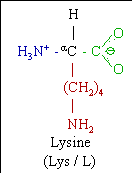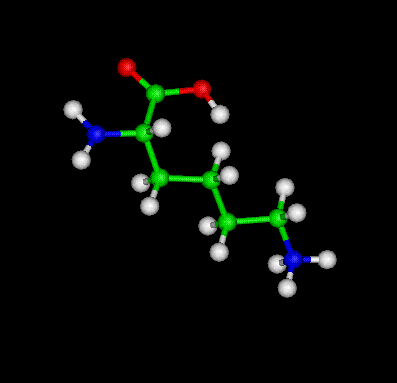
Lysine is one of the 20 most common natural amino acids on Earth. Nutritionally, in humans, lysine is an essential amino acid that has a net positive charge at physiological pH values making it one of the three basic (with respect to charge) amino acids. This polar amino acid is commonly found on the surfaces of proteins and enzymes, and sometimes appears in the active site.
Lysine can be used as a nutritional supplement to help against herpes. A deficiency in Lysine can result in a deficieny in niacin (which is a B Vitamin). This can cause the disease pellagra. Plants that contain significant amounts of lysine include:
- Buffalo Gourd (10,130 - 33,000 ppm) in Seed
- Berro, Watercress (1,340 - 26,800 ppm) in Herb.
- Soybean (24,290 - 26,560 ppm) in Seed.
- Carob, Locust Bean, St.John's-Bread (26,320 ppm) in Seed;
- Black Bean, Dwarf Bean, Field Bean, Flageolet Bean, French Bean, Garden Bean, Green Bean, Haricot, Haricot Bean, Haricot Vert, Kidney Bean, Navy Bean, Pop Bean, Popping Bean, Snap Bean, String Bean, Wax Bean (2,390 - 25,700 ppm) in Sprout Seedling;
- Ben Nut, Benzolive Tree, Drumstick Tree, Horseradish Tree, Jacinto (Sp.), Moringa, West Indian Ben (5,370 - 25,165 ppm) in Shoot.
- Lentil (7,120 - 23,735 ppm) in Sprout Seedling.
- Asparagus Pea, Goa Bean, Winged Bean (21,360 - 23,304 ppm) in Seed.
- Lambsquarter (3,540 - 22,550 ppm) in Seed.
- Lentil (19,570 - 22,035 ppm) in Seed.
- White Lupine (19,330 - 21,585 ppm) in Seed.
- Black Caraway, Black Cumin, Fennel-Flower, Nutmeg-Flower, Roman Coriander (16,200 - 20,700 ppm) in Seed.
- Spinach (1,740 - 20,664 ppm) in Plant.
- Amaranth, Quinoa

